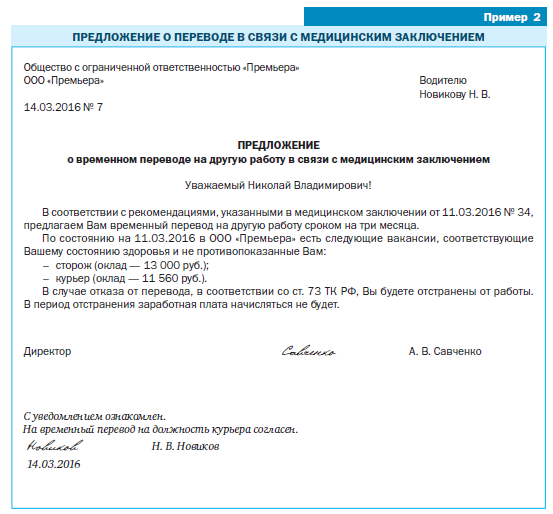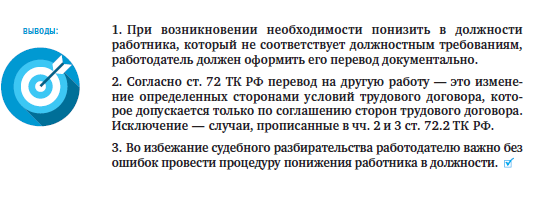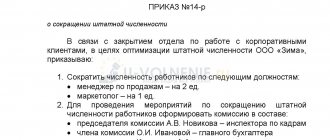The reason for transferring an employee to a lower position may be either official necessity, where the initiator is the employer, or the employee’s own desire. But for some workers, demotion is the result of disciplinary action.
Situations when it is necessary to demote an employee do not occur often, and there are not many options when this can be done legally. And yet, employers manage to add to the practice of labor disputes through erroneous decisions and actions. In the article, we will consider in which cases an employer can demote an employee without violating his rights.
Labor legislation allows an employer to demote an employee in certain cases:
Let's look at several examples of transferring an employee to a lower position and give recommendations on how to prepare the relevant documents.
Transfer at the initiative of the employer (temporary)
According to Part 1 of Art.
72.2 of the Labor Code of the Russian Federation, by agreement of the parties, concluded in writing, an employee may be temporarily transferred to another job with the same employer for a period of up to one year, and in the case where such a transfer is carried out to replace a temporarily absent employee, for whom, in accordance with the law, the place of work is retained until the employee returns to work. When registering a temporary or permanent transfer of an employee to a lower position at the initiative of the employer, it is important to obtain the employee’s consent. To do this, it is necessary to draw up an additional agreement to the employment contract (example 1).

Based on an additional agreement to the employment contract, the employer issues an order to transfer the employee to another job.
Demoting an employee - how to do everything right - All about personnel
Situations related to the transfer of an employee to a lower position always raise many questions from employers. From the article you will learn when such a transfer can be made, what documents will need to be completed, and how to reflect payments guaranteed to certain categories of personnel in tax accounting.
Let us recall that on the basis of Article 72.
1 of the Labor Code of the Russian Federation, transfer to another job is a permanent or temporary change in the labor function of an employee and (or) the structural unit in which he works (if the structural unit was specified in the employment contract), as well as transfer to work in another location together with the employer. In turn, the labor function is to work according to the position according to the staffing table, profession, specialty, indicating qualifications; the specific type of work entrusted to the employee (Article 15 of the Labor Code of the Russian Federation).
When you are demoted, your job function changes. This is accompanied by a number of amendments to the essential terms of the employment contract. But first things first.
When can you be demoted?
Demotion may be permanent or temporary. The transfer can be initiated by either the employer or the employee. However, it is rare to find employees who ask for a lower position. After all, this usually entails receiving lower wages.
Please note: transfer to a lower position is permitted only with the written consent of the employee. Exceptions are cases related to emergency circumstances listed in Part 2 of Article 72.2 of the Labor Code of the Russian Federation.
If the employee does not agree, the entrepreneur must have grounds for demotion. Labor legislation allows you to do this in several situations:
- by written agreement of the parties (Part 1 of Article 72.2 of the Labor Code of the Russian Federation). The purpose of such a transfer is often to replace a temporarily absent employee;
— due to downtime (part 3 of article 72.2 of the Labor Code of the Russian Federation);
— due to the employee’s refusal to work in new conditions (Article 74 of the Labor Code of the Russian Federation);
- in connection with the suspension of the employee’s special right (Article 76, clause 9, part 1 and part 2, article 83 of the Labor Code of the Russian Federation). Such rights include a work permit for a foreign citizen, a driver’s license, the right to carry a weapon for an employee of a private security company, etc.;
— due to a reduction in the number or staff of employees (clause 2, part 1 and part 3, article 81 of the Labor Code of the Russian Federation);
- based on the results of the certification (clause 3, part 1 and part 3, article 81 of the Labor Code of the Russian Federation). In this case, transfer to a lower position is an alternative to dismissal for lack of proper qualifications;
- according to a medical report (Article 73 of the Labor Code of the Russian Federation);
— to eliminate the impact of adverse production factors on a pregnant woman (Part 1 of Article 254 of the Labor Code of the Russian Federation);
- due to the impossibility of performing previous labor functions by a woman who has children under the age of one and a half years (Part 4 of Article 254 of the Labor Code of the Russian Federation);
- due to the expiration of a woman’s employment contract during her pregnancy, if this contract was concluded during the performance of the duties of an absent employee (Part 3 of Article 261 of the Labor Code of the Russian Federation);
- in connection with the termination of an employment contract due to violation of the rules for its conclusion (Article 84 of the Labor Code of the Russian Federation).
Please note: some individual entrepreneurs transfer employees to lower positions for committing a disciplinary offense. However, such actions are illegal. Article 192 of the Labor Code of the Russian Federation contains a closed list of types of disciplinary sanctions: reprimand, reprimand and dismissal. As you can see, demotion of an employee is not included in this list.
For your information.
The position of an employee who is on parental leave until the child reaches three years of age is not vacant (Part 4 of Article 256 of the Labor Code of the Russian Federation). During such leave, the employment contract with her continues to be valid.
Thus, the entrepreneur is not obliged to offer this position to the employee for transfer based on the results of certification. A similar conclusion is contained in the Determination of the St. Petersburg City Court dated August 30, 2010 No. 33-11908.
Documentation of translation
Any change in the essential terms of the employment contract at the will of both parties must be documented. The diagram (p. 20) shows the document flow when employees are demoted.
Demotion due to health reasons
An employee who needs to be transferred to another job in accordance with a medical report issued in the manner established by federal laws and other regulatory legal acts of the Russian Federation, with his written consent, the employer is obliged to transfer to another job available to him that is not contraindicated for the employee for health reasons (h 1 Article 73 of the Labor Code of the Russian Federation). Depending on the doctor’s recommendations, such a transfer can be either permanent or temporary. Note :
The medical report must be issued in the Procedure established by Order of the Ministry of Health and Social Development of Russia dated May 2, 2012 No. 441n “On approval of the Procedure for issuing certificates and medical reports by medical organizations.” When an employee is transferred to another lower-paid job with a given employer in accordance with a medical certificate issued in the prescribed manner, labor legislation establishes certain guarantees for such an employee. So, according to Art. 183 of the Labor Code of the Russian Federation, he retains the average earnings from his previous job for one month from the date of transfer, and in case of transfer due to a work injury, occupational disease or other work-related health damage - until permanent loss of professional ability to work is established or until recovery employee.
At the end of the period, the transfer as a general rule is terminated, and the employee is given the work provided for in the employment contract.
If, in accordance with a medical report, an employee needs a temporary transfer to another job for a period of more than four months or a permanent transfer, then if he refuses the transfer or the employer does not have the corresponding job, the employment contract is terminated in accordance with clause 8 of part 1 of Art. 77 of the Labor Code of the Russian Federation (Part 3 of Article 73 of the Labor Code of the Russian Federation).

Information about the temporary transfer of an employee is not entered into the work book. If necessary, he can confirm this fact based on the following documents:
- a copy of the additional agreement to the employment contract on temporary transfer to another job;
- a copy of the order for transfer to another job (the employee has the right to request it from the personnel department in accordance with Article 62 of the Labor Code of the Russian Federation).
Information about transfers to permanent work must be entered into the employee’s work book no later than a week later, duplicating them in the employee’s personal card.
Transfer to a lower paid job as a disciplinary punishment
Ivan Shklovets, Deputy Head of the Federal Service for Labor and Employment
- Answer: How to formalize a temporary transfer of an employee to another job
Types of temporary transfers Temporary transfer is a type of transfer. Among the temporary transfers we can conditionally highlight: In addition, the temporary transfer of professional athletes has its own characteristics (Article 348.4 of the Labor Code of the Russian Federation).
Temporary transfer by written agreement By written agreement of the parties, an employee can be temporarily transferred to any other job. The maximum duration of such a transfer is one year.
In cases where an employee replaces another temporarily absent employee, the transfer may last longer - until the other employee starts work again. Upon expiration of the temporary transfer period, the employee must be given his previous job.
Administrative liability is provided for the application of disciplinary sanctions to employees that are not provided for by labor legislation (Article 5.27 of the Code of Administrative Offenses of the Russian Federation).
- Transfer to a lower paid job for a period of three months. The HR department received this order with the corresponding clause: “The chief specialist of the OK should prepare an order on the temporary relocation of workers from 00.00.0000.” Tell me what is the best way for us to proceed? Take applications from workers for temporary relocation or transfer them based on this order???
It is necessary to distinguish between transfer to another job within the same organization and relocation. In both cases, the employee remains employed within the same organization. However, these concepts are not identical. When an employee moves, his workplace changes, but the terms of the employment contract and job function remain the same.
My judicial practice
Attention Prohibition on movement It is prohibited to move an employee if work in the new conditions is contraindicated for him due to health reasons (Part 4 of Article 72.1 of the Labor Code of the Russian Federation). Difference between relocation and transfer Relocation should be distinguished from the transfer of an employee to permanent work within the same organization.
The rules for processing transfers and transfers are different.
But if, after changing the employee’s workplace, at least one condition of the employment contract has changed, then this should be regarded as a transfer.
Transfer to permanent work within the same organization is permitted only with the written consent of the employee.
Disciplinary action
The employee can express his consent (disagreement) to the transfer by making an appropriate entry on the notice or in the form of a separate statement. The duration of the transfer, which is carried out without the employee’s consent, cannot exceed one month. Moreover, the number of such transfers and their frequency are not limited by law.
The employee’s work during the period of temporary transfer (both with and without consent) must be paid upon actual payment, but not lower than the average earnings for the previous job. This is stated in parts 2, 3 and 4 of Article 72.2 of the Labor Code of the Russian Federation. Documentary confirmation of the validity of the transfer In the event of a dispute arising about the legality of the transfer without the employee’s consent, the employer needs to prepare documents that will confirm the existence of circumstances allowing such a transfer to be carried out (clause 17 of the resolution of the Plenum of the Supreme Court of the Russian Federation dated March 17, 2004 No. 2).
How to transfer employees to a lower-paid job for a period of three months?
Such rules are established by part 3 of article 192 of the Labor Code of the Russian Federation. Situation: Is it possible to deprive an employee of a bonus for committing a disciplinary offense.
The payment of bonuses is provided for by the Regulations on bonuses in the organization. The answer to this question depends on whether it is provided in the Regulations on bonuses that an employee may be deprived of a bonus for failure to fulfill official duties or not.
As a general rule, for committing a disciplinary offense, an organization can impose only the following types of disciplinary sanctions on an employee:
- comment;
- rebuke;
- dismissal.
This is stated in Article 192 of the Labor Code of the Russian Federation. Disciplinary action in the form of deprivation of bonuses is not provided for in labor legislation.
2.4. disciplinary transfers
Code, other federal laws.
The employer has, among other things, the right to: conclude, amend and terminate employment contracts with employees in the manner and on the terms established by this Labor Code of the Russian Federation and other federal laws; require employees to perform their job duties and take care of the employer’s property (including the property of third parties owned by the employer, if the employer is responsible for the safety of this property) and other employees, and to comply with internal labor regulations; bring employees to disciplinary and financial liability in the manner established by this Code and other federal laws; adopt local regulations.
Disciplinary sanctions: commandments for personnel officers
Such rules are established by part 3 of article 192 of the Labor Code of the Russian Federation. Situation: Is it possible to deprive an employee of a bonus for committing a disciplinary offense.
The payment of bonuses is provided for by the Regulations on bonuses in the organization. The answer to this question depends on whether it is provided in the Regulations on bonuses that an employee may be deprived of a bonus for failure to fulfill official duties or not.
As a general rule, for committing a disciplinary offense, an organization can impose only the following types of disciplinary sanctions on an employee:
- comment;
- rebuke;
- dismissal.
This is stated in Article 192 of the Labor Code of the Russian Federation. Disciplinary action in the form of deprivation of bonuses is not provided for in labor legislation.
How to transfer employees to a lower-paid job for a period of three months? Temporary transfer to another job is possible ONLY in case of production necessity and for a period of no more than one month (Article 74 of the Labor Code of the Russian Federation). In this case, the employee is paid a salary not lower than the average for his main job.
And only with his written consent is it possible to transfer to a lower-paid job, again for a period of no more than one month.
Do you have an answer to this question? You can leave it by clicking on the Reply button. Similar questions Does the employer have the right, without the employee’s consent, to transfer the employee to another position not related to the one currently occupied.
On March 17, 2008, a court decision was made to deprive him of his driver’s license for a period of 4 (four) months.
In addition, temporary transfer of an employee without his consent is also permitted in the following cases:
- just me;
- the need to prevent destruction or damage to property;
- the need to replace a temporarily absent employee.
In this case, two additional conditions must be met:
- these cases must be caused by emergency circumstances (catastrophe, accident, fire, flood, etc.);
- the job to which the employee is transferred must correspond to the employee’s qualifications or be more qualified.
If the last condition is not met, that is, the employee is transferred to a less qualified job, it is necessary to obtain his written consent. To do this, draw up a notice and show it to the employee against his signature. Upon expiration of the temporary transfer period, the employee must be given his previous job.
For committing a disciplinary offense, that is, failure or improper performance by an employee through his fault of the labor duties assigned to him, the employer has the right to apply the following disciplinary sanctions: 1) reprimand; 2) reprimand; 3) dismissal on appropriate grounds.
Federal laws, charters and regulations on discipline may also provide for other disciplinary sanctions for certain categories of employees. The application of disciplinary penalties not provided for by federal laws, charters and regulations on discipline is not permitted.
Before applying disciplinary action, the employer must request a written explanation from the employee.
Source: https://law-uradres.ru/perevod-na-nizheoplachivaemuyu-rabotu-kak-distsiplinarnoe-nakazanie/
Demotion based on certification results
If the employee does not correspond to the position held or the work performed due to insufficient qualifications, confirmed by the results of certification, then if there are vacant lower positions (lower paid jobs) in the organization, the employer must first offer the employee a transfer to another job, and only if the transfer is refused, dismiss him according to the above mentioned grounds (part 3 of article 81 of the Labor Code of the Russian Federation).
For the certification results to be legal, the employer must approve the Certification Regulations. If such a document is missing, the certification performed is considered invalid.
Official website of the Supreme Court of the Russian Federation
As the Supreme Court explained, the failure of an employee to sign a new fixed-term service contract or changes to an existing contract means that an agreement between him and the employer’s representative on a new appointment was not reached.
According to one AG expert, the Supreme Court’s ruling contains an important conclusion that the legislation on public service should be applied only in conjunction with the labor legislation of the Russian Federation.
Another noted that the Supreme Court actually made one general conclusion that the procedure for recruiting a civil servant for the relevant position must be strictly followed. The Judicial Collegium for Civil Cases of the Supreme Court issued Ruling No. 5-KG20-158-K2 on a labor dispute between the Federal Property Management Agency and its former employee declaring her transfer to another position and subsequent dismissal illegal.
The transfer to a temporary position ended with dismissal.
In August 2021, Natalia Kolgatina was hired into the civil service as deputy head of the portal technology development department of the Information Technology Directorate of the Federal Property Management Agency. A service contract was concluded with her for an indefinite period. Subsequently, the woman applied to management with an application to appoint her to the position of deputy head of the information resources operation department in connection with K., who was filling this position, going on maternity leave.
The request was fulfilled, and on October 8, 2021, an order was issued to transfer Natalia Kolgatina to a new position. A month later, the departmental personnel service sent the woman a notice of familiarization with the transfer order, since she was on sick leave. The very next day, Natalia Kolgatina withdrew her application to fill the desired position; the document was received by the Federal Property Management Agency on November 27, 2021. On the same day, she wrote to the head of the department with a request to recognize her transfer from the old position to the new one as illegal and to restore her to the position of deputy Head of Portal Technologies Development Department.
At the end of November 2021, K., who was on maternity leave, notified management that her maternity leave would end in December of the same year. In this regard, the employer informed Natalia Kolgatina about the termination of the service contract concluded with her to fill a new position in connection with her colleague’s return to work. In December 2021, she was dismissed from the civil service due to the expiration of her fixed-term service contract.
At the same time, the dismissed employee appealed to the Ministry of Economic Development and the Moscow Prosecutor's Office with complaints about the illegality of the transfer from a permanent position to a position filled by another civil servant, and subsequent dismissal from the civil service.
The lower courts sided with the Federal Property Management Agency
Next, Natalia Kolgatina filed a lawsuit against her former employer to recognize the transfer and dismissal orders as illegal, demanding that she be reinstated in the civil service and pay compensation for moral damage in the amount of 850 thousand rubles. According to the plaintiff, she wrote an application for transfer to a new position under psychological pressure and misleading information about the upcoming departmental reorganization. The woman added that she was not familiarized with the order to transfer to another position, she did not sign a service contract to fill the new position, and after the transfer she continued to perform her previous duties, so the transfer to the new position did not actually happen.
During the trial, the defendant’s representative presented an act drawn up by employees of the personnel service of the Federal Property Management Agency on Kolgatina’s refusal to familiarize herself with the order of transfer to a new position for the period of maternity leave for K. and from signing a fixed-term service contract to fill this position. The court decision noted that the civil servant was not familiar with this act. Nevertheless, the court rejected the claim, recognizing the transfer to a new position and subsequent dismissal as legal. At the same time, the court found that Natalia Kolgatina personally submitted an application for transfer to a new position and was familiarized with the new job description. All this, the court decision emphasized, testified to the voluntariness of the plaintiff’s actions and the absence of a violation of her labor rights by the Federal Property Management Agency.
The court of first instance also pointed out the lack of evidence reliably confirming the fact that the plaintiff was under pressure from the employer’s representative, as well as continuing to perform her previous functions in the new position. Subsequently, the court's decision survived appeal and cassation. At the same time, the second instance added that the plaintiff agreed in writing to be transferred to another position for a certain period - for the duration of her colleague’s maternity leave. As the appeal explained, the employee’s revocation of the statement she previously wrote has no legal significance, since the Civil Service Law does not provide for such a possibility.
The Supreme Court did not agree with the findings of the lower courts
Having considered the complaint of Natalia Kolgatina, the Judicial Collegium for Civil Cases of the Supreme Court recalled that in order to formalize official relations in the civil service, it is necessary not only to issue the relevant act of the government agency, but also to conclude a service contract, which comes into force from the moment it is signed by the parties.
In turn, the appointment of a civil servant to another (unvacant) civil service position in the same government agency not stipulated by his service contract for the period of temporary absence of the employee filling such a position on a permanent basis is possible only by agreement of the parties to the contract. Failure of a civil servant to sign amendments to an existing service contract or a fixed-term service contract for transfer to another position means that an agreement on such an appointment has not been reached. “Otherwise, it would be contrary to the basic principles of legal regulation of labor (service) relations on the free choice of work by a citizen on the basis of free consent, the prohibition of forced labor and discrimination in the field of labor and the stability of the civil service,” the Court concluded.
As the Supreme Court noted, the courts of the first and appellate instances, when resolving the claims of Natalia Kolgatina, did not apply these regulatory provisions defining the grounds and procedure for concluding a service contract, its essential conditions and the significance of the service contract when formalizing service relations, as well as the conditions for temporary replacement by a civil servant of another civil service positions. As a result, the actual legal relations of the parties and circumstances relevant to the case were not established.
The highest court listed a number of circumstances that needed to be established for the correct resolution of the case: whether the defendant followed the procedure for appointing the plaintiff to a new position; whether an agreement was reached between the Federal Property Management Agency and the plaintiff on such a transfer, taking into account the latter’s failure to sign a fixed-term service contract for a non-vacant position filled by K. on a permanent basis; as well as the fact that the plaintiff sent a written application to the department to withdraw and invalidate her application for transfer to a new position.
The Supreme Court added that the lower authorities did not give a legal assessment to the plaintiff’s arguments that she did not agree with the transfer from a permanent position to a temporary one. In addition, they ignored the woman’s allegations that she wrote an application for appointment to a new position forcibly under pressure from a representative of the employer in anticipation of organizational and staffing measures to reduce staff without indicating the date of filing this application, and her other arguments.
As the Court explained, the appeal’s conclusion that the Civil Service Law does not provide for a civil servant to revoke his consent to a transfer to another position is also untenable. The Supreme Court noted that this law does not prohibit the withdrawal of an application for the appointment of a civil servant as a temporary replacement for a non-vacant position until the parties sign the relevant changes to the existing service contract or until a fixed-term service contract is concluded in accordance with the established procedure. Thus, the acts of the lower courts were canceled, and the case was returned for a new trial at the first instance.
AG experts commented on the Court’s findings
Lawyer of the Moscow AP Pavel Andreev noted that during the consideration of the case in the Supreme Court, Lyudmila Pchelintseva, the chairman of the judicial panel for social labor disputes of the civil collegium of the Supreme Court, personally presided. The decision, he said, emphasizes the important argument that civil service legislation should be applied only in conjunction with the labor legislation of the Russian Federation.
“In this dispute, the lower courts assessed the factual circumstances of the case from the point of view of the employee’s will by writing an application for transfer, and the Supreme Court drew attention to the fact that until the parties have signed an agreement on transfer to another position, such a transfer is not considered carried out from the point of view of law, as labor and civil service legislation. The Supreme Court also emphasized that the civil servant did not actually take up new duties because she was in a state of temporary disability, which was not assessed by lower courts. The definition of the RF Armed Forces guarantees every civil servant the right to withdraw a submitted application for transfer to another position, just as it is guaranteed to employees from the point of view of labor legislation,” the expert explained.
He added that the judicial act is significant for law enforcement practice not only because it emphasizes the need for the simultaneous application of civil service legislation and labor legislation, but also because in labor relations and in the official relations of the civil service, not only the will of the employee and such local acts, such as statements or orders. “First of all, the agreement itself between the employee and the employer is important - both on the transfer to work and on any other essential conditions of the legal relationship between them. Only such an agreement signed by the parties entails the emergence of a new legal relationship for them, which was not done by the employer in this case, and this can no longer be made up for by him,” summed up Pavel Andreev.
Partner at the Law & Commerce Offer Law Firm, Anton Alekseev, believes that the Supreme Court, in fact, made one general conclusion that the procedure for employing a civil servant for the relevant position must be strictly observed. “What was important was the presence of a new fixed-term contract signed by the employee or the signing of amendments to the existing contract, as well as the fact that he was familiar with the order of appointment to a new position. In this case, the presence of an application for transfer to another position of the employee himself did not matter,” he explained.
According to the lawyer, the Supreme Court, in the absence of a concluded contract with the employee to work in a new position, qualified the order to transfer him to a new position as a temporary transfer of the employee to another position. “Accordingly, the Supreme Court justifiably applied the norms of the Labor Code governing the temporary transfer of an employee to another position. It should be noted that in the text of the ruling, the Supreme Court several times refers to the principle of stability of the civil service, which presupposes the constancy of official activities for each civil servant,” added Anton Alekseev.
Zinaida Pavlova
Demotion as a result of remote discipline
Taking into account the provisions of regulatory legal acts, demotion as a disciplinary sanction can only be applied to certain categories of employees :
- Investigative Committee (Article 28 of Federal Law No. 403-FZ dated December 28, 2010 “On the Investigative Committee of the Russian Federation” (as amended on December 30, 2015));
- police (Part 3, Article 15 of the Federal Law of November 30, 2011 No. 342-FZ “On service in the internal affairs bodies of the Russian Federation and amendments to certain legislative acts of the Russian Federation” (as amended on July 3, 2016));
- Prosecutor's Office (Article 41.7 of the Federal Law of January 17, 1992 No. 2202–1 “On the Prosecutor's Office of the Russian Federation” (as amended on July 3, 2016)).









